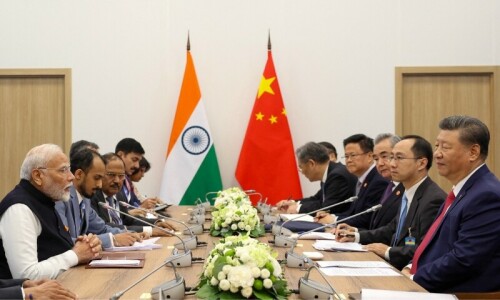SERIOUS concerns had been raised by opposition political parties — particularly those with presence in KP — after Prime Minister Shehbaz Sharif announced the launch of Operation Azm-i-Istehkam on Saturday.
Considering that KP has been hit the hardest by terrorism, the concerns raised by these parties were understandable, as local communities were worried about fresh violence and displacement, similar to what was witnessed during earlier military campaigns.
Reacting to these concerns, the administration clarified matters on Monday when, in a statement released by the PM Office, it was pointed out that no large-scale displacement will take place, and the envisaged operation will largely be a ‘mopping up’ exercise to clear out the “remnants” of militant groups.
There can be little doubt about the need to crush the terrorist threat before it gains further strength. It is a fact that militant actors have regrouped after nearly every previous military operation. Thus, to make Azm-i-Istehkam a success, the lacunae of past operations must be studied minutely.
The new operation also seems to be partly influenced by vocal Chinese concerns about the need for security in Pakistan. Whatever the triggers, clear deterrent action is needed against terrorist groups, but without upending the lives of people in the affected areas, and causing mass displacement.
The state seems to have realised the need for this balance, as reflected in Monday’s PMO statement. The government should continue to take all stakeholders on board, as without feedback from all political forces, it will be difficult to convince the affected populations of the operation’s necessity. True, operational details cannot be divulged; but, if need be, sensitive information can be shared with lawmakers in camera.
Moreover, Pakistan has been losing an unacceptably high number of security men to terrorist attacks over the past few years. The latest attack came last week in Kurram, in which five troops were martyred. This is not a conventional war, and the military needs to consider forming specialised units trained to counter the asymmetric measures employed by militant groups. In the cities, it is the police, through the CT departments, that should be leading the fight against terrorist groups.
The state must also continue to communicate to the Afghan Taliban the need to prevent their soil from being used against Pakistan, and to rein in the TTP. This pressure needs to continue along with CT operations on Pakistani soil. And, as the military takes on the militants on the battlefield, a complementary effort against extremism will also be required.
As witnessed in the aftermath of earlier military campaigns, unless the support structure of terrorist groups in the country is completely dismantled, these entities can spring up with new names. The twin battles against militancy and extremism will not be easy to fight, but are essential for Pakistan.
Published in Dawn, June 25th, 2024













































Dear visitor, the comments section is undergoing an overhaul and will return soon.